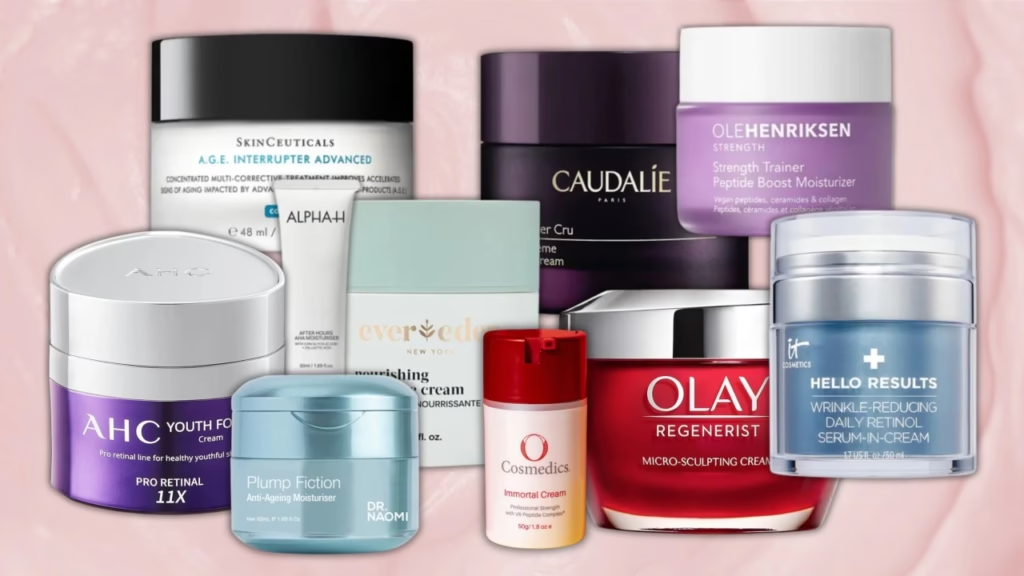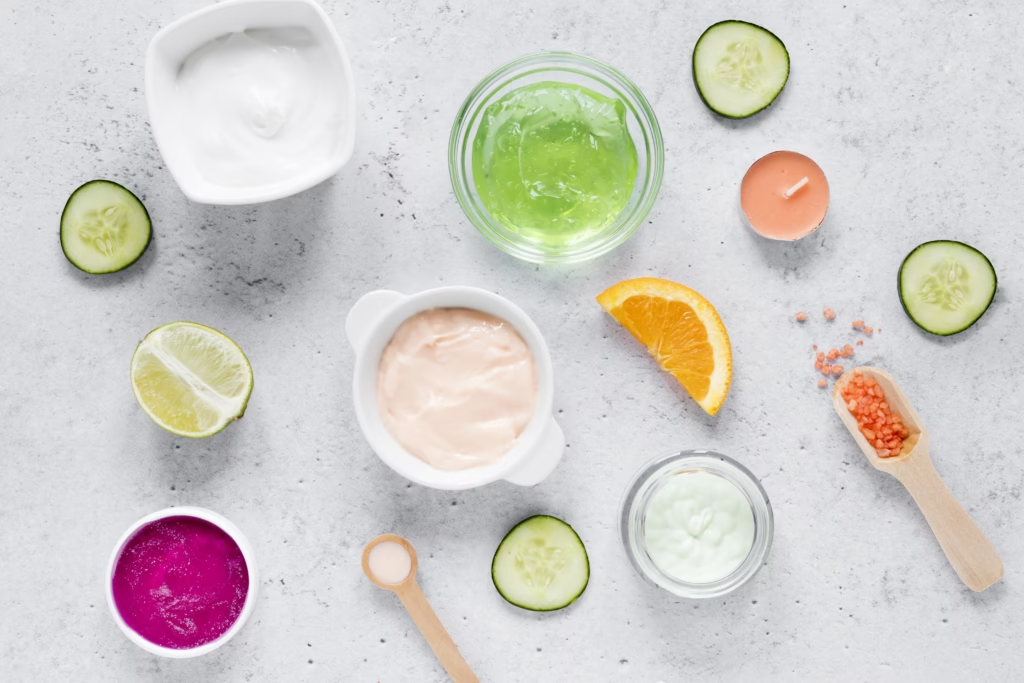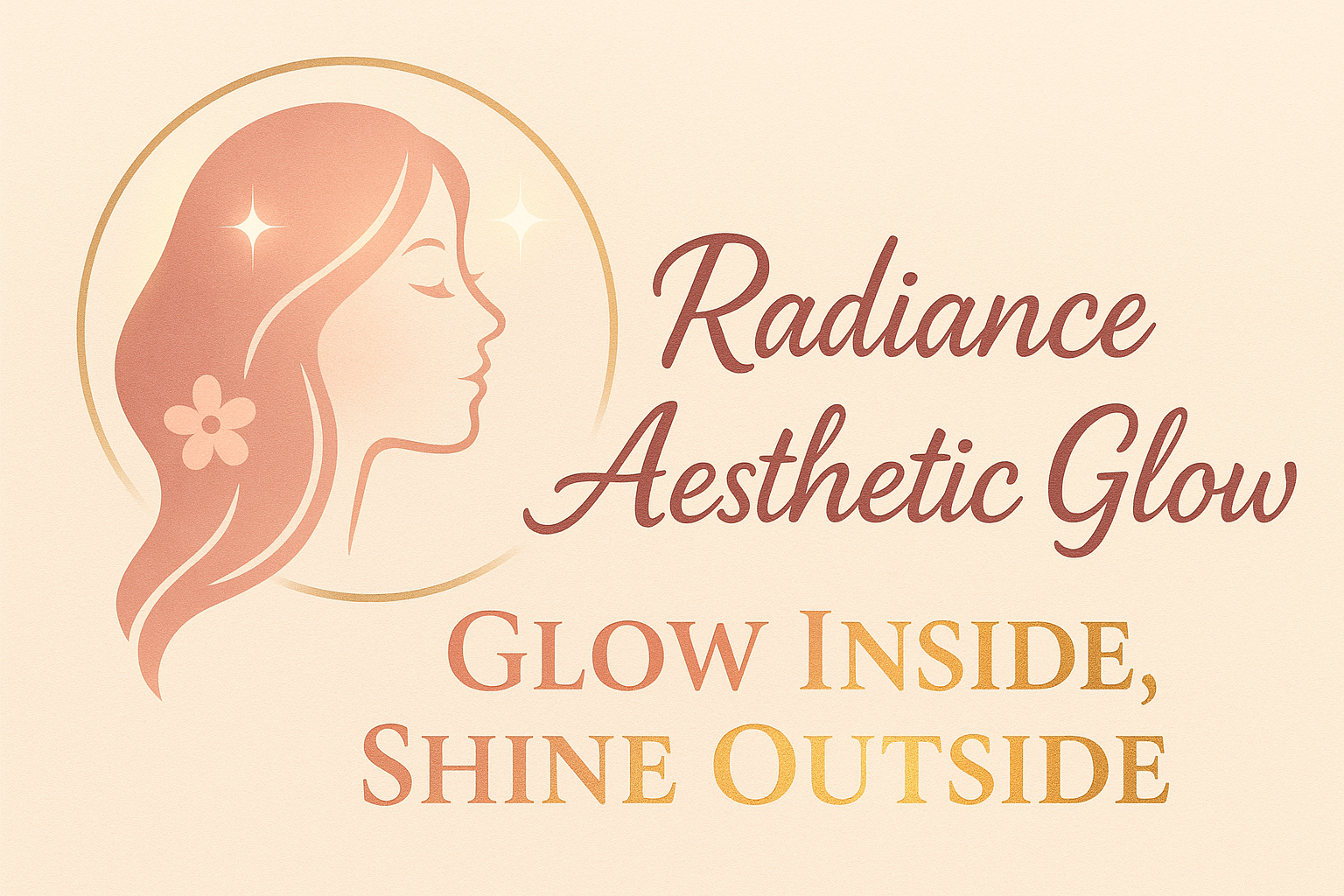The Very Best Anti-Aging Creams: A Fun & Expert Guide
If you’ve ever wondered whether a jar of cream can erase those fine lines, you’re not alone. Anti-aging creams promise a lot—from wrinkle reduction to a youthful glow – but do they deliver? Dermatologists agree there’s no magical “fountain of youth in a jar,” though certain ingredients can help smooth and plump the skin. In this guide, we’ll break down how anti-aging creams work and what to look for, mixing expert tips with a splash of humor.

At its core, an anti-aging cream is often just a super-moisturizer with extra active ingredients. Even plain moisturizing can improve the look of skin: it “plumps the skin, making lines and wrinkles less visible,” notes the Mayo Clinic. The real boost comes when creams add proven actives. Ingredients like retinol, vitamin C, and hyaluronic acid can help support collagen, fade spots, and provide deep hydration. But remember: results take time. As Harvard Health notes, it can take three to six months of nightly use to start smoothing wrinkles (with the best results often taking up to a year).
Key Ingredients to Look For
When asking, “What is the very best anti-aging cream?” the answer often comes down to ingredients. Here are the star players in the anti-aging game:
Retinol (Vitamin A) – Often found in a retinol anti-aging night cream, retinol is the gold-standard anti-aging ingredient. It boosts skin cell turnover and collagen production, smoothing out fine lines and wrinkles. Patience is key. Harvard Health reports that even prescription-strength retinoids may need 3–6 months of regular use to start smoothing wrinkles. (The maximum improvement typically takes closer to a year.) Retinol can cause initial dryness or irritation, so dermatologists recommend starting with a low dose or using it every other night and always applying sunscreen in the daytime.
Vitamin C—A morning staple is a vitamin C brightening cream. Vitamin C is a powerful antioxidant that battles free radicals (from sun and pollution) to prevent early aging. It also boosts collagen and evens skin tone. Studies show that daily vitamin C use can improve wrinkles and overall skin texture within a few months. Plus, it brightens dark spots, giving you a radiant glow. (Pro tip: Vitamin C works even better when layered under sunscreen.)
Hyaluronic Acid – Think of hyaluronic acid as a drinking straw for your skin’s moisture. A hyaluronic acid face cream delivers intense hydration. HA can hold vast amounts of water – even a tiny pinch can bind gallons of water– plumping up fine lines. Research confirms that HA-based products are “an effective solution for improving skin hydration and rejuvenation.” Dermatologists often include hyaluronic acid because it gives almost instant plumping, making wrinkles look less visible.

Peptides & Collagen Boosters – Lots of creams shout “collagen boost!” on their labels. You’ve probably seen Collagen Boost Night Cream on a shelf. Here’s the reality: most collagen molecules in creams are too large to penetrate the skin. Instead, look for peptides, which are small protein fragments that signal your skin to produce more collagen and elastin. (Retinoids also stimulate collagen from within. In short, don’t get swayed by collagen slogans on jars – focus on ingredients like retinol and peptides instead.
Other Antioxidants & Botanicals – Many anti-aging creams include other antioxidants like niacinamide, green tea extract, or vitamin E. Think of these as supporting players: they calm inflammation, brighten skin, and help your main ingredients work better. For example Korean anti-aging formulas, in particular, often use gentle, natural ingredients (like aloe, centella, or snail mucin) to strengthen the skin barrier while fighting signs of aging.
Korean Skincare Anti-Aging Secrets
Korean skincare (K-Beauty) has taken the world by storm, and for good reason. The Korean anti-aging approach emphasizes hydration, gentle layering, and consistency. Instead of slapping on one thick cream, Korean routines often use multiple lightweight layers—toner, essence, serum, then moisturizer – to build hydration. The idea is that well-hydrated skin resists wrinkles better. Dermatologists explain that Korean skincare “works on the principle of creating hydration and balance, which keeps the skin feeling smooth and prevents signs of the natural aging process”. You’ll find humectants like hyaluronic acid, antioxidants like green tea, and herbal ingredients like ginseng in many Korean anti-aging products.
In short, K-Beauty shows that layering multiple gentle products can be as effective (and often more fun) than one heavy cream. Most Korean anti-aging products are fragrance-free and mild, making them suitable for all skin types. (And yes, they work for everyone – men or women – so see our “unisex” section next!)
Choosing the Right Cream for You
With dozens of options on the market, how do you pick your best anti-aging cream? Here are some tips to tailor the choice:
Morning vs. Night: A good rule is Vitamin C in the morning, retinol at night. In the a.m., apply a vitamin C brightening cream or serum, then always use a broad-spectrum sunscreen. Sunscreen is your #1 anti-aging step. At night, use a retinol anti-aging night cream or a peptide-rich night treatment. (Your skin repairs itself while you sleep, so that’s prime time for retinol or collagen-boosting peptides.)
Skin Type & Texture: If you have oily or combination skin (or live in a humid climate), look for a lightweight anti-aging moisturizer – for example a gel-cream or lotion that absorbs quickly. These hydrate the skin without any greasy feel. If you have very dry skin, a richer, emollient cream may be better (think thicker lotions or creams, maybe with extra ceramides and oils) – some are even marketed as a wrinkle reduction moisturizer. In any case, the goal is deep hydration: a Mayo Clinic review emphasizes that a good moisturizer alone can make wrinkles less visible.
Sensitive Skin: If your skin is easily irritated, seek out products labeled dermatologically tested, especially for retinol. You might start with a low-dose retinol or use it every other night, and include calming ingredients like niacinamide. In other words, go slow and gently. (For example, experts say: “seek out ‘dermatologically tested retinol creams’ or those labeled gentle” if irritation is a concern.)
Unisex Anti-Wrinkle Creams: Anti-aging is for everybody! Many formulas are already crafted as unisex anti-wrinkle creams, meaning anyone can use them. A good anti-wrinkle formula works on collagen or pigment regardless of gender. Men often have thicker skin, but they benefit from retinol and vitamin C just the same. Don’t shy away from a product because it’s “for women” or “for men” – check the ingredients list, not the marketing color.
Best Anti-Aging Cream in India (and Sunny Climates): In countries like India, intense sun exposure is a major aging factor, so SPF is crucial. The best anti-aging cream in India (or any sunny climate) often includes sun-protective antioxidants or even built-in SPF. In fact, dermatologists remind us that UV rays break down collagen over time, so wearing a broad-spectrum SPF each morning is as vital as your night cream. Look for brightening ingredients (like vitamin C or niacinamide) that can help counteract pigmentation from the sun.
Pros and Cons of Anti-Aging Creams

To set realistic expectations, here are the general pros and cons:
- Pros: Anti-aging creams can contain truly effective ingredients. Retinoids and vitamin C, for instance, have been shown in clinical studies to improve wrinkles and skin texture. Even hyaluronic acid or glycerin gives an immediate plumping boost by hydrating the skin. Many modern formulas also multitask (hydration + brightening + antioxidant protection). Best of all, creams are non-invasive and easy to use daily – a consistent routine (along with healthy habits) can yield visible improvements over time.
- Cons: No cream is a time machine. Don’t expect a face-lift from a jar. Over-the-counter wrinkle creams typically give only modest improvements (as Mayo Clinic bluntly notes, if you’re looking for a “face-lift in a bottle,” you probably won’t find it). Results usually take weeks to months to appear. Potent ingredients like retinol can cause redness, peeling, or dryness at first. And remember, cosmetics aren’t FDA-tested like medicines—companies don’t have to prove big claims. In short, think of anti-aging creams as one helpful tool in your routine, not a magical cure.
The Bottom Line
So, what is the very best anti-aging cream? The truth is, the “best” cream is one with the right ingredients for your skin, used consistently. Focus on science-backed actives (retinol, vitamin C, hyaluronic acid, peptides) in concentrations your skin can tolerate. Don’t be dazzled by gimmicky names – whether it’s sold as a Collagen Boost Night Cream or a dermatologically tested retinol cream, check that it has proven ingredients inside.
And wherever you live – New York, New Delhi, or elsewhere – remember: sun protection is part of anti-aging. UV exposure breaks down collagen over time, so a daily broad-spectrum SPF is just as important as your night cream.
For the best deals and All Products availability – Click Here
A good anti-aging routine is more like healthy habits in a jar: it supports your skin’s renewal and plumps what’s already there. With the right products (Korean layering or classic serums) and realistic expectations, you’ll help keep your skin looking its best. After all, aging gracefully is about taking care of your skin, not pretending the years didn’t happen.
Sources: Dermatologists and health experts (Harvard Health, Mayo Clinic, etc.) emphasize ingredients like retinoids, antioxidants, and moisturizers for anti-aging. Clinical reviews support hyaluronic acid and peptides for hydration and firming. Always consider expert advice and your own skin type when choosing products.


